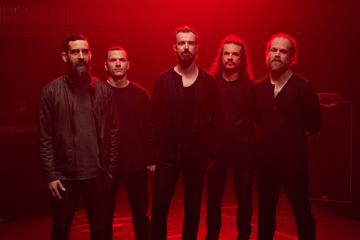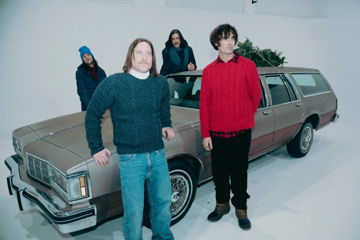How Rancid's Seminal Third Album Set Them Apart From The '90s Punk Pack
Where their contemporaries saw major-label money in the headlights, the die-hard DIYers remained independent to the core
rancid - ...and out come the wolves (epitaph)
released 22 august, 1995
Ever since it first arose in the mid-1970s as a response to the disco sheen and pompous vanity of mainstream music, punk rock has, by its nature, been at its very best when actively railing against something.
That may sound like an obvious statement — after all, what is punk without a sense of protest? — but ultimately the genre has been fighting against its own popularity and enduring sense of being anti-establishment since its infancy. Proto-pop-punk helped beget hardcore punk, thrash punk, and other styles that sought to be even more abrasive and less accessible than their progenitors — and, in kind, the wholesale embrace by the mainstream public of more radio-friendly acts such as Green Day and The Offspring in the mid-1990s undoubtedly helped give us its equal and opposing force: the indomitably DIY Californian punk outfit Rancid.
Formed from the ashes of 1980s US ska pioneers Operation Ivy, Rancid "arrived" — in a meaningful sense — on the musical landscape in 1994 with their breakthrough second album, Let's Go, the same year that Green Day and The Offspring would ensnare an entire generation of young music-lovers with their respective iconic albums Dookie and Smash (while elsewhere, NOFX would drop Punk In Drublic and Bad Religion would put out Stranger Than Fiction — man, 1994 was a nutso year for amazing punk records). However, it was with 1995's ...And Out Come The Wolves that Rancid made arguably the biggest statement about their mission and values as a band — as punk-rock gained further mainstream acceptance with the ascendance of labels such as Epitaph and Fat Wreck Chords, and the pop-infused sensibilities of the Californian skate-punk scene emerged at the fore, Rancid held up a tattooed middle finger to the newly formed armies of kids in cargo pants and long socks and did what their contemporaries dared not — namely, whatever the fuck they wanted.
Don't miss a beat with our FREE daily newsletter
Where Green Day and The Offspring both looked the part but demonstrably, with their consequent follow-ups Insomniac (1995) and Ixnay On The Hombre (1997) and beyond, kowtowed to the whims of whatever would get them the most airplay — and, look, if you measure success in terms of money, then both bands have been infinitely more successful than Rancid could ever dream of being — Rancid wholly committed to their now-well-established ideals of being as hard, fast and rough-as-balls as possible, yet constantly demonstrated a level of technical musicianship that a passing glance wouldn't reveal beyond the cacophonous instruments and frontman Tim Armstrong's infamously strained and cigarette-addled warble.
...And Out Come The Wolves wastes no time in making the point with its furious opening track, Maxwell Murder, which has over the past two decades become the premier choice of track to play for anybody looking to mindfuck a sceptical party about punk's hidden technicality with one of the best bass solos of the latter 20th century, courtesy of bassist Matt Freeman. Seriously, it's become such an iconic solo that it is the main focus of Urban Dictionary's entry for the song. It's a display of frightening proficiency that literally comes out of nowhere, listeners having been thrust into the album's adventure with a breakneck count-in and borderline nonsensically delivered co-vocals from Armstrong and fellow guitarist Lars Frederiksen.
All this isn't to say that there wasn't some degree of pop infusion throughout the album's tracks - it yielded three singles, after all, and even those tracks that weren't deemed "it" enough (whatever "it" is) to be highlighted for airplay weren't entirely devoid of accessibility. In that respect, they weren't, and never have been, that different from more financially successful bands.
However, such sonic elements tended to filter through not from any evidently manufactured design but rather Rancid's indelible, organic penchant for the mechanics of ska, arising from Armstrong and Freeman's time together in Operation Ivy; thus, the alt-beat up-strum, gang-vocal-heavy ebullience of second track The 11th Hour becomes an early reassurance of sorts, that despite the slapdash aesthetic and total apparent absence of fucks to be given by anyone in this band about anything at all, there is an underlying musicality and proficiency not just on this album but across Rancid's discography; it doesn't make them a universally loved cup of tea, but it certainly helps to decrease the chasm of misunderstanding between people who worship the band and those who don't see the appeal.
Unsurprisingly, Rancid continues to ride the ska/reggae vibe throughout the album, especially on consequent tracks - and two of the album's three singles - Roots Radicals and Time Bomb, the former tipping its hat to the more-relaxed hallmarks of reggae by sticking to a more restrained tempo than you'd ordinarily find on a punk record, as well as giving healthy airtime to boisterous choral vocal refrains and Freeman's ever-walking bass lines, while the lattter is prototypical '90s ska, sans horns but still carrying its second-wave influence proudly (the clip even features a cut to a poster for British ska pioneers The Specials).
The band's final single from ...And Out Come The Wolves, Ruby Soho, is probably now one of Rancid's best-known tracks, its infectiously singalong-worthy chorus doing much to help people forget that not much else really happens in its near-three-minute run time. Yet, despite its overall simplicity - it's actually one of the plainest songs on the record, even by punk-rock standards - it's endured as emblematic of Rancid's mid-'90s output, mostly because it was a regular fixture on programs such as Video Hits, right next to the likes of better-known punk singles of the time like When I Come Around and Come Out & Play.
And, sure, if you had to briefly explain punk to an alien and wanted to lump together the variably successful punk acts of the late 20th century in any kind of aurally legible sense, then Ruby Soho definitely reflects the more "general" popular west-coast US sound of the time better than a lot of its ska- or thrash-influenced album-mates. But to do so would be to do Rancid a disservice, for where ...And Out Come The Wolves' true legacy lies is not in its similarities to its subcultural brethren, but its differences. It was instrumental in opening the door for a whole new generation of DIY acts to stick to their creative guns in the face of mainstream pressure, even if it means missing out on commercial success. If there's any lesson to take from the legacy of the album - its title itself a reference to the sudden interest surrounding Rancid following their 1994 breakthrough - it's probably that staying true to yourself in spite of uncertainty is its own greatest reward.
A mansion probably would've been nice, though.
track list
1. Maxwell Murder
2. The 11th Hour
3. Roots Radicals
4. Time Bomb
5. Olympia WA
6. Lock, Step & Gone
7. Junkie Man
8. Listed M.I.A.
9. Ruby Soho
10. Daly City Train
11. Journey To The End Of The East Bay
12. She's Automatic
13. Old Friend
14. Disorder & Disarray
15. The Wars End
16. You Don't Care Nothin'
17. As Wicked
18. Avenues & Alleyways
19. The Way I Feel







